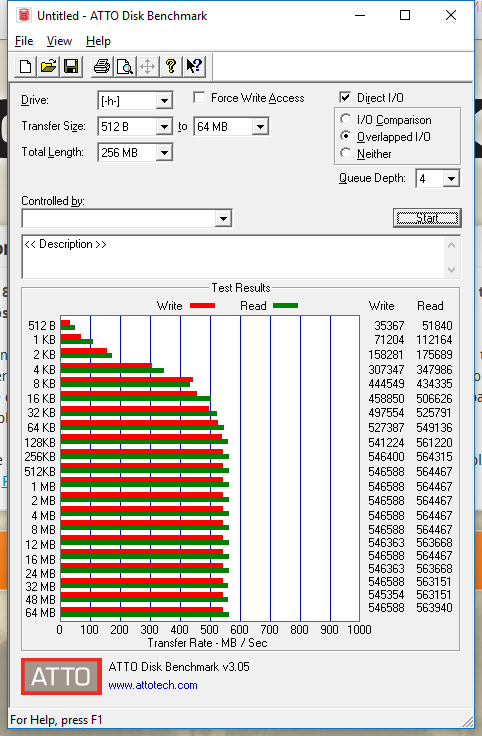ATTO Disk Benchmark is perhaps one of the oldest benchmarks going and is definitely the main staple for manufacturer performance specifications. ATTO uses RAW or compressible data and, for our benchmarks, we use a set length of 256mb and test both the read and write performance of various transfer sizes ranging from 0.5 to 8192kb. Manufacturers prefer this method of testing as it deals with raw (compressible) data rather than random (includes incompressible data) which, although more realistic, results in lower performance results.
240GB
Initial results with ATTO show that the TR200 delivers speeds that exceed its rating of 550MB/s read and 525MB/s. This is always a pleasant surprise. Here they all achieved 564MB/s read and 546MB/s write. Furthermore, you can see that even at smaller file sizes the TR200 delivers competitive results that ramp up quickly as the file size increases.
CRYSTAL DISK BENCHMARK VER. 5.2.1 X64
Crystal Disk Benchmark is used to measure read and write performance through sampling of random data which is, for the most part, incompressible. Performance is virtually identical, regardless of data sample so we have included only that using random data samples.
240GB
In Crystal Disk Mark, the TR200 delivers around 560MB/s read and 500-525MB/s write performance. In terms of 4K random, the results are on the low side compared to other SSDs we have seen. 4K QD1 read comes in at about 34MB/s while 4K QD1 write is about 97-100MB/s.
The toughest benchmark available for solid state drives is AS SSD as it relies solely on incompressible data samples when testing performance. For the most part, AS SSD tests can be considered the ‘worst case scenario’ in obtaining data transfer speeds and many enthusiasts like AS SSD for their needs. Transfer speeds are displayed on the left with IOPS results on the right.
240GB
480GB
960GB
In AS SSD the TR200’s scores are 1123, 1020, 1000 points respectively. We notice that the performance seems to go down slightly even though the capacity goes up. Focusing on the sequential performance we can see that its read results are at around 520MB/s while write ranges from 450 to 480MB/s. 4K QD1 performance is still on the low side for writes, but during reads the TR200 delivers a result of 50MB/s, which is very competitive with that of the Samsung 850 EVO and other high-end mainstream SATA SSDs. The 240GB model here was the closest to the IOPS rating with 4K threaded performance that came in at 81K IOPS for read and 84K IOPS for write. Finally, during the copy test, it delivered decent results ranging from 260MB/s to 420MB/s across capacities.
ANVIL STORAGE UTILITIES PROFESSIONAL
Anvil’s Storage Utilities (ASU) are the most complete test bed available for the solid state drive today. The benchmark displays test results for, not only throughput but also, IOPS and Disk Access Times. Not only does it have a preset SSD benchmark, but also, it has included such things as endurance testing and threaded I/O read, write and mixed tests, all of which are very simple to understand and use in our benchmark testing.
240GB
480GB
960GB
In Anvil Storage Utilities, the TR200 delivered below average results. Again, we see that the 240GB model is delivering better performance than its higher capacity brethren, but still only achieved an overall score of 3,800 points. The average sequential performance came in at 490MB/s read and 460MB/s while 4K performance is similar to that of what we have seen with previous tests.
 The SSD Review The Worlds Dedicated SSD Education and Review Resource |
The SSD Review The Worlds Dedicated SSD Education and Review Resource | 


I find it a little bit amusing, how small is that flashdrive controller. It is smaller than just the SATA data connector! I know its size is nothing new, and it would not look out-of-place in a mSATA module. But that little controller package, connected to eight memory packages (each three times its size), on that 2.5″-class board, is a funny sight.